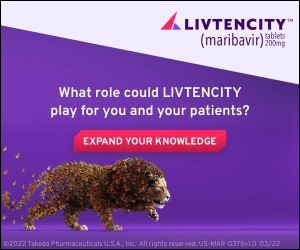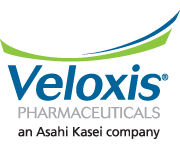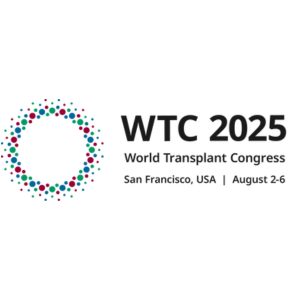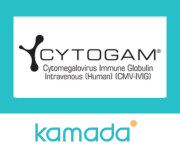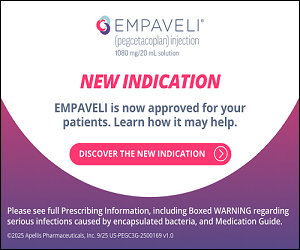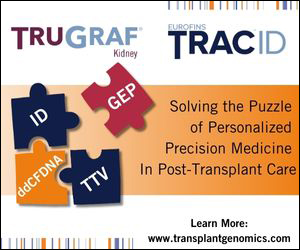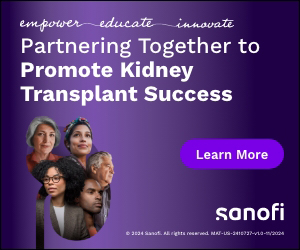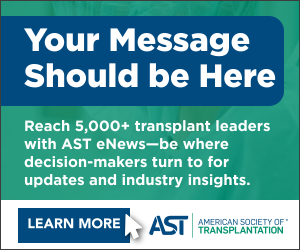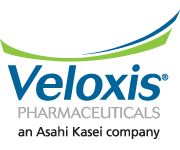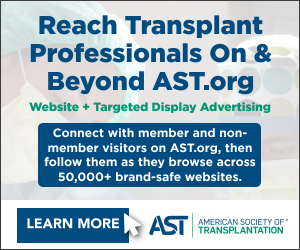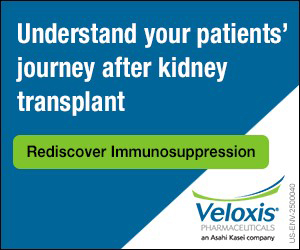 |
|||||||||||||||||||||||||||||||||||||||||||||||||||||||
| Past Issues | Subscribe | Advertise | myAST.org | |||||||||||||||||||||||||||||||||||||||||||||||||||||||
|
Important Dates
AST News
Medical Directors Forum
Join your colleagues in sharing innovative approaches to clinical practice, gaining insight into transplant finance, and expanding your leadership skills at the AST Medical Directors Forum.
Fellows Symposium: Registration Open
Registration for the Fellows Symposium on Transplantation is now open! This comprehensive program is designed for clinical fellows and residents, surgical fellows, research fellows, pharmacists, and other trainees planning a career in transplantation medicine, surgery, or research.
Fellows, residents, trainees, and pharmacists who meet the eligibility criteria can apply for a travel grant. Fellows and those who do not meet the travel grant criteria may register as general attendees. Medical students are also welcome to attend. Registration Open for International Transplantation Science 2025
On behalf of the AST, the European Society for Organ Transplantation (ESOT), and The Transplantation Society (TTS), we are excited to announce that registration is officially open for the International Transplantation Science Meeting 2025.
ITS 2025 marks the fourth tri-society event in this global collaboration, bringing together top experts, early-career researchers, and transplant professionals worldwide. This meeting offers an exciting forum to explore cutting-edge basic and translational science in and beyond the field of transplantation.
New Resource: AST Mentorship Program
We’re excited to introduce the AST Mentorship Program, a new member benefit designed to foster meaningful, career-shaping connections across the transplant community.
Whether you're looking to give back as a mentor or grow as a mentee, this program supports all transplant professionals — including students and trainees — with a flexible structure that fits your schedule and preferred way to connect: remote, hybrid, or in-person.
Spread the Word: AST Student Membership - Only $29!
Students can join the AST for just $29 now through June 30! This limited-time offer is a great opportunity to connect with leaders in the field, access valuable educational resources, and explore a future in transplantation.
Know a student who might be interested? Please share this with your network! Submit Your Transplant Fellowship Program
The AST is compiling a centralized list of transplant fellowship programs to better support early-career clinicians, researchers, and trainees exploring careers in transplantation. This directory will be a valuable tool for those seeking information on training opportunities in organ transplantation.
If you're affiliated with a transplant fellowship program, we invite you to submit your program for inclusion. Your participation will help us develop a meaningful and accessible resource for individuals in transplantation. AST Affiliate Membership
We’re excited to launch a new Affiliate Membership designed specifically for business professionals who want to connect with the transplant community. Affiliate Membership is the perfect way to stay connected, enhance your career, and take full advantage of what our organization has to offer.
ACGME Releases Proposed Requirements for Transplant Nephrology Training Programs
In September 2024, the Accreditation Council for Graduate Medical Education (ACGME) Board of Directors approved an application for accreditation of transplant nephrology training programs. This application and the subsequent ACGME Board approval was the direct result of work done by a joint AST-ASN Task Force. As the next step in this process, ACGME has recently released transplant nephrology graduate medical education program requirements for review and comment. Please visit this ACGME webpage to review the proposed transplant nephrology program requirements and submit your feedback using the provided comment form by June 18.
Contact Congress About the Living Donor Protection Act
The Living Donor Protection Act (LDPA) has been reintroduced in Congress, and we need your support. This bipartisan legislation would prohibit insurance discrimination against living organ donors, ensure they can use FMLA leave during recovery, and require updated educational resources to promote donation.
Take action now — urge your lawmakers to support the LDPA.
DOJ Announces Intent to Use False Claims Act To Target Diversity and DEI Initiatives
The Department of Justice (DOJ) will use the False Claims Act (FCA) to investigate and pursue claims against entities that violate federal civil rights laws, including anti-discrimination and equal employment opportunity obligations, which may include diversity, equity, and inclusion (DEI) programs. Unlike many federal civil rights laws, the FCA allows for significant uncapped damages.
To the extent your organization receives an inquiry from the Department of Justice or any agency inquiring about compliance with federal civil rights laws or DEI, contact your counsel. Recipients of federal funds should carefully review any representations regarding federal civil rights laws or DEI associated with federal contracts or grants. Further, recipients of federal funds should proactively review their compliance with federal civil rights laws and initiate such review promptly, prioritizing review of externally facing information, as such information could trigger an investigation. Make Your Voice Heard: Protect Transplant Research Funding
Funding cuts to the National Institutes of Health (NIH) put critical transplant research at risk. NIH-funded studies have driven advancements in transplantation, improving patient outcomes and paving the way for innovations like new immunosuppressants, immune tolerance strategies, and even organ regeneration. Without this support, progress in the field could slow, affecting countless patients and families.
We need your help to ensure that transplant research remains a priority. Use our advocacy page to contact your members of Congress and urge them to protect NIH funding. Together, we can make a difference. Take action today!
AST Public Policy Form
The AST developed a survey aimed at soliciting your perspectives on legislative and regulatory issues that significantly influence both patient care and professional practice. Our goal is to establish a platform for our membership to share their invaluable ideas and perspectives and actively engage with the Public Policy Committee and AST leadership. We look forward to your input as we navigate the dynamics of our ever-evolving landscape of transplant care and practice.
Key Articles in Transplantation
Over 1000 Pancreas Transplants in a Latin American Program
Pancreas transplantation (PT) is an effective treatment for patients with type 1 diabetes and end-stage renal disease, or brittle diabetes. However, the total number of PT and high-volume programs has declined worldwide during the past decade. This study aimed to analyze the experience of >1000 PTs in a high-volume Brazilian program.
Practices in the Management of Kidney Transplant Candidates and Recipients with Obesity: A Survey of U.S. Transplant Programs
There is growing kidney transplant program-level interest in addressing obesity. The American Society of Transplantation Kidney Pancreas Community of Practice Obesity Work Group surveyed U.S. programs to characterize evaluation, listing, and weight management practices. A web-based survey was administered to professionals involved in kidney transplant care (transplant nephrologists/surgeons/coordinators/dietitians, endocrinologists, bariatric surgeons, obesity medicine specialists) from 5-9/2024.
Generic Versus Brand-Name Immunosuppression Following Heart Transplant: An Analysis of the UNOS Database
Immunosuppressant medications, such as tacrolimus and mycophenolate mofetil (MMF), are crucial for preventing graft rejection after heart transplantation (HTx). Generic formulations have become available, offering potential cost savings, but concerns exist regarding their clinical bioequivalence compared to brand-name formulations. Current guidelines suggest no increased risk with generic use, but research remains limited. Therefore, this study aims to explore whether the type of immunosuppressant formulation at hospital discharge influences post-transplant outcomes.
|
|||||||||||||||||||||||||||||||||||||||||||||||||||||||
